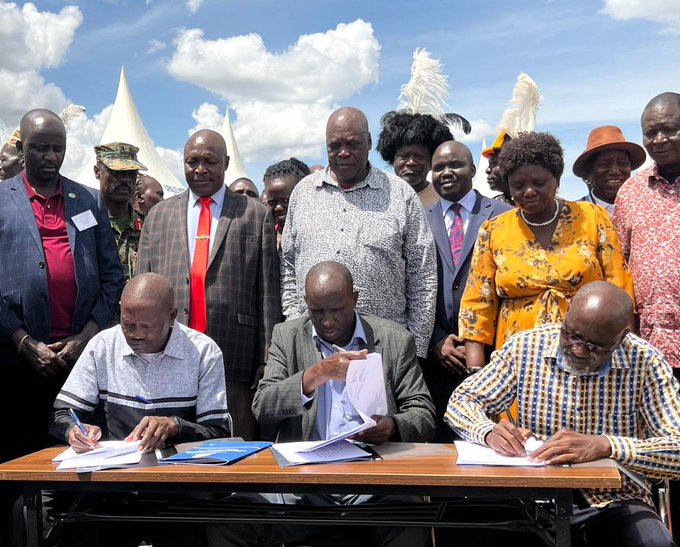MOROTO, November 5, 2024 — The Leaders of the Ateker border communities comprising Kenya’s Turkana, Uganda’s Karimojong, and South Sudan’s Toposa and Didinga, recently signed a joint report resolving to foster peaceful co-existence, deepen cultural linkages and amicably address community-based issues.
The Ateker leaders who convened in Moroto, Uganda, for the High-Level Meeting of Ateker Leaders and Border Communities Sensitisation on peaceful co-existence, agreed to support governments’ efforts to mobilise the community to participate in the concurrent disarmament process. This is as the leaders noted that the illegal firearms within their community contribute greatly to the insecurity in the border areas.
They further resolved to use traditional and alternative dispute resolution mechanisms to manage and resolve conflicts at the community level and agreed to establish joint resource management committees to address resource scarcity and prevent resource-based conflicts between communities.
The leaders further urged the Governments of Kenya and Uganda to prioritise the signing of a resource-sharing agreement to ensure equitable access and usage of shared resources, benefiting border communities. In addition, they urged their Governments to prioritize the construction of roads, markets, abattoirs and other essential infrastructure.
Speaking during the opening session, the Chief Guest, Rebecca Alitwala Kadaga, Uganda’s 1st Deputy Prime Minister and Minister of East African Community Affairs, reaffirmed the Government of Uganda’s commitment to implementing the resolutions from the East African Community’s first peace caravan.
The Minister emphasised that the government is dedicated to improving infrastructure, noting that the Suam One-Stop Border Post is nearing completion on the Ugandan side, while the 73-kilometre tarmac road from Kapchorwa to Suam has been completed.
Kadaga further outlined various security measures that the Ugandan Government has put in place including; inspections of police armories to ensure safe weapon storage, training law enforcement officers in physical security and stockpile management and marking firearms for easier tracing.
“The government has implemented a fingerprinting system for both police and civilian-owned firearms, creating a forensic database for crime investigations,” she said, adding that the Anti-Stock Theft Unit [ASTU] has been deployed to combat livestock theft, while the Uganda People’s Defence Force [UPDF] is conducting ongoing security operations to ensure public safety.
The Minister informed attendees about the recent negotiations between the Republics of Kenya and Uganda, resulting in a Memorandum of Understanding on the cross-border Transformation Agenda for Uganda [Karamoja and Sebei] and Kenya [Turkana and West Pokot], along with a resource-sharing agreement for the communities involved. “These documents will be signed during the upcoming Summit of the Two Heads of State in Moroto, underscoring both countries’ commitment to achieving lasting peace and development for these communities,” she added.
This gathering follows the First EAC Peace Caravan for border communities of the Atekar community, held in June-July 2023.
The initiative aims to promote peaceful coexistence, good neighborliness, and peaceful dispute resolution among border communities through experiential learning from successful practices in the region.
Following the high-level meeting with Ateker community leaders, a series of sensitization sessions will be conducted to promote the peace caravan’s resolutions, peaceful coexistence, and regional integration in Moroto [Uganda[, Lokichogio [Kenya], and Narus [South Sudan].
On her part, Kenya’s Cabinet Secretary for East African Community, Arid and Semi-Arid Areas [ASALs] and Regional Development, Beatrice Moe Askul, recapped several projects implemented by the Government of Kenya among the border communities of Turkana and West Pokot.
“We have constructed three peace dams namely; Naku’etum in Turkana County, Kases in West Pokot County and Forore- Aldere in Marsabit County. We also installed the Nasal solarized borehole in West Pokot and constructed Urum water distribution systems in Turkana County,” she added.
The Minister also highlighted ongoing research into conflict dynamics and adaptation mechanisms among the Turkana, West Pokot, and Karamoja communities.
The Minister further urged leaders to ensure that these resolutions are communicated within their communities for support and implementation.
On his part, the Governor of South Sudan’s Eastern Equatorial State, Louis Lobong Lojore, representing the country’s Minister of East African Community Affairs, emphasised that economic cooperation is a key priority. He called for discussions to focus on enhancing cross-border trade and infrastructure development, particularly regarding shared resources like water and pasturelands.
“This programme aims to improve livelihoods and foster integration along the borders. We have established border committees for delimitation and communities should leave border matters to their respective governments while focusing on their livelihoods. The Ateker should allow livestock to move freely and graze without conflict,” he noted.
Additionally, the EAC Deputy Secretary General in charge of Infrastructure, Productive, Social, and Political Sectors, Andrea Aguer Ariik Malueth, noted that decisions made in the meeting need to have a set timeframe to ease coordination.
He further urged the border communities to allow infrastructure development to enhance the economic and social development of the areas.
Ariik further cited boundary contestation, delimitation, and demarcation as root causes of disputes that have allowed new conflict drivers to emerge, prolonging tensions.
“We need to come together to fight against the proliferation of illicit small arms and light weapons, climate change-induced hazards like prolonged drought, and the perceived presence of natural resources in the borderlands,” he stated.
Also in attendance were official delegations from Uganda, Kenya and South Sudan comprising MPs, Governors, Honourable Members of the County Assembly, and Country Commissioners among others.
https://thecooperator.news/karamoja-leaders-to-be-empowered-as-role-models-in-communities/
Buy your copy of thecooperator magazine from one of our country-wide vending points or an e-copy on emag.thecooperator.news
